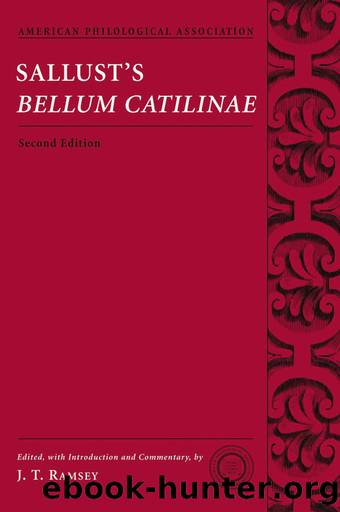Sallust's Bellum Catilinae by J. T. Ramsey;

Author:J. T. Ramsey; [Ramsey;, J. T.]
Language: eng
Format: epub
ISBN: 9780195320848
Publisher: OxfordUP
Published: 2007-09-15T00:00:00+00:00
CHAPTER 21
(1)abunde: a predicative adv. (vid. 20.2n. frustra): lit., âto whom all evils existed in abundance,â i.e., âwho were overwhelmed by . . .â
neque res neque spes: cf. 20.13; the variation below (opis aut spei) indicates that res here means âresources.â
quieta: n. acc. pl., object of the inf. movere: âstable conditionsâ (cf. 34.2).
movere: = perturbare, just as motus is used to describe a political disturbance or insurrection (42.1). The inf. serves as the subject of videbatur, while merces (lit., âwages,â i.e., compensation for their effort) is the predicate nominative. Alliteration here (mmm) and in the following clauses (pppp qu c qu pp qu) produces weightiness and is used for emphasis.
condicio belli: âterms of the warâ (cf. 20.6), i.e., the goals to be sought and the means at their disposal, as the next two indirect questions make clear. The reference to bellum and arma at this stage in Catilineâs plans in 64, when his hopes of being elected consul were still high, introduces a false note and anticipates measures that were adopted out of desperation after his second defeat at the consular elections in 63 (26.5).
foret: this alternate form of esset may sometimes be regarded as having a future sense, here =futura esset, as can be seen from the corresponding expression at 20.6.
ubique: best taken in the generalizing sense, = âanywhere,â although the meaning et ubi is also possible.
(2)tabulas . . . omnia: this is one of the longest series of words in asyndeton in S. (6 members) and continues the rapid-fire pace set in chapt. 20 through the frequent employment of asyndeton (e.g., 20.15, five members).
tabulas novas: lit., ânew tablets,â i.e., ânew account books,â the standard expression for the cancellation of debts. Tabulae were the tablets on which records of financial transactions were inscribed. Catiline held out the hope that the loans recorded in these ledgers would be abolished so that the slate would be wiped clean.
proscriptionem locupletium . . . sacerdotia: these words expand upon the incentives enumerated at 20.14 (divitiae, decus, gloria). The dictator Sulla was the first Roman to eliminate his political enemies systematically and confiscate their property by offering a bounty for the murder of his victims, whose names were posted on proscription lists (cf. 11.4n.). This practice was revived with even greater ruthlessness by the triumvirs in late 43 at about the time S. was writing this monograph. Sacerdotia refers primarily to the four major collegia or boards of religious officials: the 15 Pontifices, 15 Augures, 15 Quindecimviri, and 7 Epulones. The members of these boards did not form a professional priestly class, but rather they were generally the same powerful nobles who sought to monopolize high political office. Roman religion and politics were always closely connected, and religious officials exercised a considerable influence on political affairs through their supervision of the calendar and the taking of the auspices which had to accompany any important act. Vacancies on these boards were filled in this period by co-optation or by a modified form of public election under the terms of legislation passed in 63 B.
Download
This site does not store any files on its server. We only index and link to content provided by other sites. Please contact the content providers to delete copyright contents if any and email us, we'll remove relevant links or contents immediately.
| Anatomy | Animals |
| Bacteriology | Biochemistry |
| Bioelectricity | Bioinformatics |
| Biology | Biophysics |
| Biotechnology | Botany |
| Ecology | Genetics |
| Paleontology | Plants |
| Taxonomic Classification | Zoology |
Sapiens: A Brief History of Humankind by Yuval Noah Harari(14000)
The Tidewater Tales by John Barth(12406)
Mastermind: How to Think Like Sherlock Holmes by Maria Konnikova(6946)
Do No Harm Stories of Life, Death and Brain Surgery by Henry Marsh(6693)
The Thirst by Nesbo Jo(6458)
Why We Sleep: Unlocking the Power of Sleep and Dreams by Matthew Walker(6376)
Life 3.0: Being Human in the Age of Artificial Intelligence by Tegmark Max(5201)
Sapiens by Yuval Noah Harari(5131)
The Longevity Diet by Valter Longo(4864)
The Body: A Guide for Occupants by Bill Bryson(4603)
The Rules Do Not Apply by Ariel Levy(4540)
The Immortal Life of Henrietta Lacks by Rebecca Skloot(4271)
Why We Sleep by Matthew Walker(4202)
Animal Frequency by Melissa Alvarez(4165)
Yoga Anatomy by Kaminoff Leslie(4112)
The Hacking of the American Mind by Robert H. Lustig(4098)
All Creatures Great and Small by James Herriot(4000)
Barron's AP Biology by Goldberg M.S. Deborah T(3952)
Double Down (Diary of a Wimpy Kid Book 11) by Jeff Kinney(3942)
